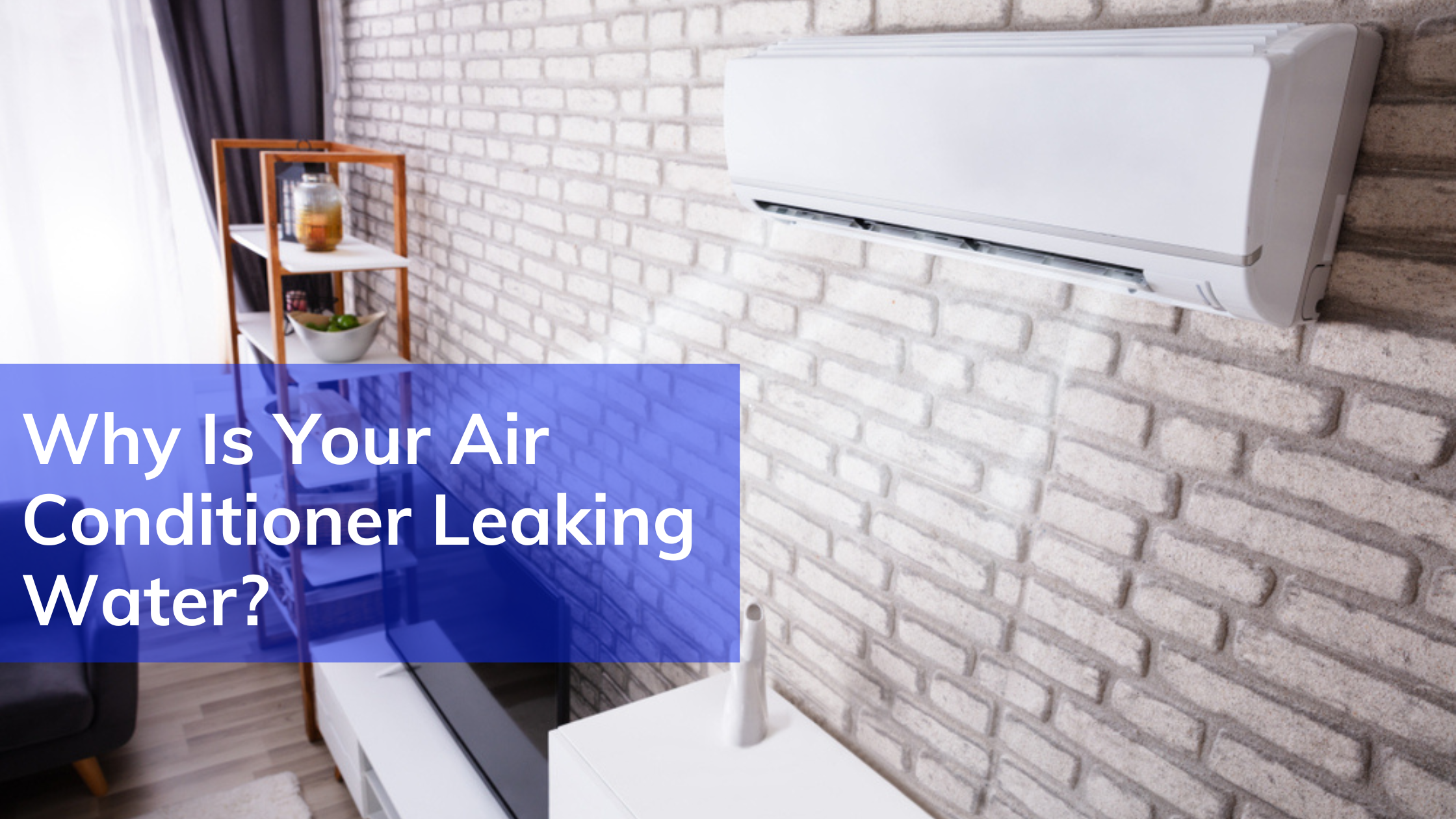Author: Jeff O'Hara
As this blog is being written—mid-August 2023—Houston has been locked in what seems like a perpetual heat wave. Temperatures have been consistently in the 90s and above since April and have been topping 100° daily since early July. Since we have the added benefit of living in a sub-tropical climate, we also have high humidity levels that seem to hang around in the 80 – 90% range.
When the temperatures and humidity are this high, your air conditioning system will work much harder than it used to. Modern whole-house HVAC systems are built with the idea of keeping the temperature in the home twenty-five degrees cooler than the outdoor environment. It’s an easy task when temperatures are in the high 80s or even the mid-90s, but in the face of the oppressively hot and humid 100°+ days we’ve endured lately, many AC systems are having problems keeping up with demand.
What Causes an AC System to Leak Water?
One sure sign that your home’s air conditioning is suffering in the heat is any situation where water leaks from anywhere in the system. Water or excessive moisture on or near your air conditioning components is abnormal and must be addressed quickly.
Water damage from leaking air conditioning components, particularly those inside the home or in the attic, can quickly cause thousands of dollars worth of damage in a short time.
There are several potential sources for water leaks from your air conditioner. Here’s a look at a few of the most common issues plaguing air conditioners in this historically hot summer.
Blocked Condensate Drain Line Issues.
The condensate drain line carries the moisture removed from the air during the cooling process away from the unit. When this drain line becomes blocked, it can lead to problems like leaks, water damage, and even potential damage to the air conditioning system itself.
The condensed moisture is usually collected and channeled through a drain line that often shares a common line with another appliance, like a sink or shower. Thus, your AC condensate drain line can be affected by what you put into the sink or bathtub that shares that drain line.
If the condensate line becomes clogged or blocked, the water will back up inside the unit, causing it to leak from the vent pipe near the unit, usually in the attic. Discovering a blocked condensate line as soon as possible is essential, as the excess water will empty into the shallow drain pan beneath your AC unit.
The condensate line doesn’t just carry excess moisture away from your air conditioner’s internals; we’ve pulled everything from dust clogs, algae and mold growth, rust, and even bugs out of these drain lines.
Clogged Air Filters.
Clogged air filters can indirectly contribute to a leaking AC unit due to how the cooling process works. The air filter’s responsibility is to capture dust, dirt, and other particles from the air before they can enter the AC system. As the filters get more clogged with contaminants, they restrict airflow to the rest of the AC system.
Dirty or debris-clogged air filters can restrict airflow over and around the evaporator coils, which will cause the coils to freeze. Check your HVAC filters if you notice your AC system is outputting lukewarm air or if it just seems like the airflow isn’t as strong as it once was. When the evaporator coils begin to thaw, the resulting condensation will drip off the pipes, creating a potential water damage issue depending on the unit’s location.
In summary, a clogged air filter reduces the airflow over the evaporator coils, causing them to freeze and thaw excessively. The excess condensate produced during thawing can overwhelm the drain system, leading to leaks.
To prevent this issue, it’s essential to regularly clean or replace your air filter according to the manufacturer’s recommendations. This helps maintain proper airflow and efficient cooling and reduces unnecessary strain on your AC system.
High Humidity.
High humidity will make the air feel hotter than it is during the summer months, but excessive moisture can also cause damage to your AC unit. The newer your HVAC system is, it will be more effective at removing humidity and channeling away the excess moisture in a manner that isn’t harmful to the HVAC system components.
Every home in Houston will feel somewhat humid on the hottest days of the season, and that’s normal. That said, signs of excessive humidity around the house, like foggy windows, musty or damp odors that seem to linger throughout the home, and even overly moist skin, could all be attributed to excessively high humidity.
High outdoor humidity can contribute to air conditioner water leaks due to its impact on the cooling process and the condensation within the AC unit. Air conditioners cool the air and dehumidify it by removing moisture. When warm, humid air passes over the cold evaporator coils inside the AC unit, the humidity in the air condenses into water droplets on the coils.
When outdoor humidity levels are high, the air contains more moisture. As a result, the evaporator coils in the AC unit will extract more moisture from the air, causing increased condensation on the coils. As the moisture on the coils condenses, it forms into water droplets.
This water collects and drips into a drip pan or drain pan beneath the coils. It can become overwhelmed if the AC unit’s drain system is not designed to handle the excess condensate caused by high humidity. The drain pan may fill up quickly, and the drain line might need help to carry away the excess water fast enough.
Water can overflow from the drip pan when the drain system cannot handle the excess condensate. This water overflow can leak around the AC unit, potentially damaging the surrounding area.
Refrigerant Leaks.
Refrigerant leaks are a completely different animal from water leaks from an AC system, but I wanted to devote a paragraph or two to them as they are common. Leaking refrigerant in an air conditioning system can lead to water leaks, although the connection may take time. The process involves the interaction between refrigerant levels, the evaporator coils, and the overall cooling process.
Refrigerant is a crucial component of the AC system. It circulates through the system, transitioning between gas and liquid states to facilitate cooling. The evaporator coils, where the refrigerant changes from liquid to gas, play a central role in cooling the air. As warm indoor air is drawn into the AC system, it passes over the cold evaporator coils. The refrigerant inside the coils absorbs heat, causing the air to cool down. Simultaneously, the evaporator coils dehumidify the air by causing moisture to condense on the coils.
If there is a refrigerant leak in the system, the balance of refrigerant can be disrupted. Leaking refrigerant reduces the amount of refrigerant available in the coils, causing them to become colder than intended. When the evaporator coils become excessively cold due to low refrigerant levels, they can cause more moisture to condense on them than usual. This excess moisture can freeze on the coils, creating ice buildup.
When the AC unit cycles off, the frozen coils start to thaw. As the ice melts, it becomes water that collects in the drip pan beneath the coils. If the amount of melted ice and condensate exceeds the drip pan’s capacity or the drain line’s ability to remove the water, the water can overflow and lead to leaks.
If you suspect a refrigerant leak in your AC system or notice water around the AC unit, contacting a professional HVAC technician is essential. They can assess the situation, address refrigerant issues, and ensure that your AC system functions efficiently and effectively, preventing potential water leaks and other problems.
What Problems Can a Leaking Air Conditioner Lead To?
A leaking air conditioner can lead to various problems, ranging from minor inconveniences to potential damage to your Sugar Land home and the AC system. Addressing a leaking AC promptly is essential to prevent these issues.
Water Damage
One of the most immediate issues with a leaking AC is water damage. Water can pool around the AC unit and leak into surrounding areas, causing damage to floors, walls, ceilings, and other structures.
Mold Growth
Excess moisture from a leaking AC can create a conducive mold and mildew growth environment. Mold can spread quickly and pose health risks, especially for those with allergies or respiratory issues.
Uneven Home Heating
A leaking AC may not cool your home efficiently because the cooling process is compromised. Leaking refrigerant or improper drainage can reduce your AC’s cooling capacity and cause uneven temperature distribution. When an AC leaks or does not operate efficiently, it must work harder and longer to maintain the desired temperature. This leads to increased energy consumption and higher utility bills.
AC Malfunction
Water from a leaking AC can damage the unit’s internal components, including electrical components. This can lead to malfunctions, breakdowns, and potentially costly repairs.
Weakened Structural Integrity
Prolonged water exposure from a leaking AC can weaken the structural integrity of your home. Over time, water damage can compromise walls, ceilings, and other building materials. Unresolved water damage and other problems caused by a leaking AC can lower the value of your home if left unaddressed.
How to Prevent a Leaking AC
To prevent these problems, addressing a leaking AC as soon as you notice any signs of water around the unit or suspect a leak is essential:
- Turn off the AC.
- Clean up any water.
- Contact a professional HVAC technician.
Experienced techs can identify the cause of the leak, perform necessary repairs, and ensure that your AC system is functioning efficiently and effectively to provide optimal cooling comfort without compromising your home’s integrity.
Nick’s is Standing by for All Your AC Emergencies!
As unfortunate as the timing may be, most air conditioning system failures happen in the middle of the summer. Just as we’re affected by the oppressive heat and humidity this summer brings us, our air conditioners can be affected by extremes in temperature and humidity.
If you notice water dripping from your air conditioning components, particularly those inside the house, call Nick’s Air Conditioning immediately. Backed-up AC drain lines or overflowing drip pans in your attic can cause thousands worth of damage in a very short time. Nick’s team of licensed, and thoroughly background-checked technicians are well-experienced in working with heat-fatigued HVAC systems and can have your home’s AC running at its peak in a single visit.


